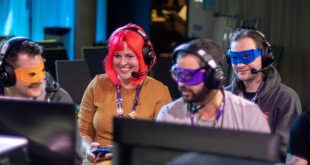
 Amiqus’ business manager Liz Prince talks to Perri Lewis, CEO of Mastered, about the organisation’s training and mentoring programmes which are helping get grads ‘job ready’, coaching ‘accidental managers’, and supporting those from under represented groups …
Amiqus’ business manager Liz Prince talks to Perri Lewis, CEO of Mastered, about the organisation’s training and mentoring programmes which are helping get grads ‘job ready’, coaching ‘accidental managers’, and supporting those from under represented groups …
Tell us about Mastered and its games bootcamps.
Mastered is a training company with a mission to give power to creators. We want to help them learn new skills so they can find a job, earn more money, get a promotion, change careers, take on bigger roles in their studios, set up their own business, or whatever else success looks like for them. We want to shape the creators, who in turn, go on to shape the stories, characters and culture that we all experience. We’ve been doing this since 2015 for more than 5,500 creators – and for the last two years, exclusively for the games industry.
Last year the Government recognised the work that we’re doing and has been funding our programmes since. Initially we focused on helping creators break into their first job through free 16-week bootcamps. Recently we’ve seen that there’s a need to support individuals’ development once they’re in a job. We now run programmes with studios to upskill their employees, especially managers, with the government paying 90% of the costs. It’s a pretty good deal.
Who are the bootcamps for?
There are two types of bootcamps. One is for jobseekers, typically looking to break into games, called ‘last mile training’. It’s for creators who’ve got a solid technical base but need that refinement to find a job. The other type is for creators already employed in the industry. We know it’s hard to hire senior talent, so these bootcamps give studios the chance to train their own staff rather than rely on buying it from an ever decreasing pool of seniors.
There are a lot of ‘accidental managers’ in the games industry, people that got there because of their technical skills but were never supported with the step up. We’re seeing a big, big need to support managers within studios, as games leadership has its own context and specific challenges.
You place an emphasis on mentoring as part of the programmes – why is this important?
We often talk about our programmes as mentoring rather than training. Training is didactic – a teacher talking (down) to a student. We think it needs to be two ways. People need support with the problems they’re facing right now – they need mentoring through challenges – rather than being taught an off-the-shelf course, in a set way, with a rigid structure. Mentoring is much more fluid, it’s about a conversation that flows both ways.
What do you see as the biggest barriers to entry for those eyeing a career in games?
At entry level, it’s got to be how few studios are hiring juniors. Resources are stretched and everyone wants to hire people who can hit the ground running. We’re often told that too many graduates are just not ‘job ready’. It’s a problem we all need to solve. Juniors today are the seniors of tomorrow, so we need to understand the challenges and start to solve them. We believe that last-mile training to help people move from education into employment can be part of the solution. Different communities face different challenges to entry too.
Some never got the chance to go to university, some face imposter syndrome, some never see role models who look like them, some need to understand how to work with their neurodiversity to better work in a studio environment. It’s really, really complex, which is why – whether we’re training people who are looking to get into the industry or looking to move upwards once they’re in – there’s always an element of 1-2-1 so we can help the person in front of us thrive.

 MCV/DEVELOP News, events, research and jobs from the games industry
MCV/DEVELOP News, events, research and jobs from the games industry




